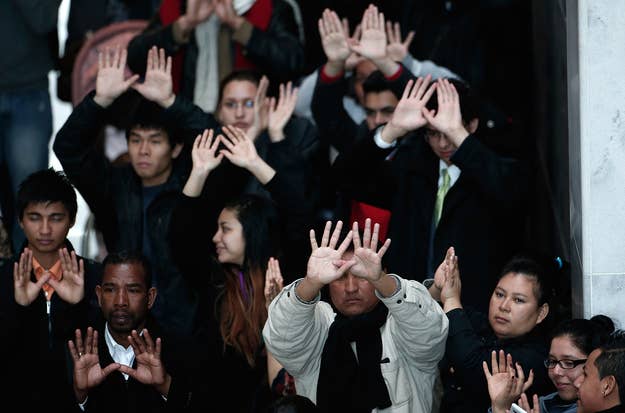
WASHINGTON — Union officials are trying to kill a bipartisan immigration reform bill by insisting on stringent protections for domestic construction workers, Republicans and business lobbyists charged Thursday.
With talks literally in their final hours, there are dozens of moving parts to the immigration bill, and nothing will be firmed up until a final universal deal is agreed to. But as senators rapidly approach a deal, everyone — immigration activists, conservative opponents, labor unions, and business leaders — is jockeying for position.
For weeks, the worker visa program, which is at the heart of the reforms to future immigration, has been one of the main sticking points in the bipartisan talks as lawmakers rapidly close in on a final agreement.
A veteran business lobbyist familiar with the talks said that while much of the public angst has been about Republicans and conservative reaction to the comprehensive package's pathway to citizenship, union leaders are also proving to be a major impediment.
"Every time you make progress … the unions come in the next day and throw something else on the table. They keep moving the goal posts," the lobbyist said.
"Everyone is pretending like the [American Federation of Labor] wants this, and they don't," the lobbyist added.
AFL-CIO spokesman Jeff Hauser rejected that argument.
"The Republican effort to suggest that employer-based visas are the front and center issue … is nothing more than a desperate negotiating ploy," Hauser said. "The future viability of the Republican Party rests on them embracing a pathway to citizenship … Republicans know they need to give up on that issue."
"But they want to, if possible, do whatever possible to cater to their business friends to lower wages … This is about being seen by their donors as fighting to the last inch," Hauser continued.
The spat, which several Senate aides said was little more than last-minute jockeying by interest groups, underscored the difficulty of achieving immigration reform.
The so-called Gang of 8 bipartisan negotiators were meeting late Thursday afternoon for the second time that day, and were expected to work well into the evening. Sen. Charles Schumer, one of the leaders of the talks, indicated he hopes to have work on the bill largely wrapped up by Friday.
According to multiple sources, several parts of the worker visa plan laid out by labor, which is led by the AFL-CIO, are proving to be particularly contentious.
Among the problematic union proposals are the following: a 10,000 annual cap on low wage work visas; barring work visas for any trade covered by Davis Bacon, a federal wage law that would encompass most of the construction industry; and creating an unemployment-based trigger for work visas that would come into effect only when employment drops below a specific level, which sources said has been proposed at several levels, including 8% and 5%.
Although there is general agreement on the use of inflation as a trigger for issuing new work visas — and the fact that construction unemployment always runs higher than national averages — the proposal has inflamed business interests.
Of particular concern to the business community is the sense that Senate Republicans involved in the talks have essentially agreed to much of what the unions want. However, Republican and Democratic aides said no final agreement has been reached and that in the end, neither business leaders nor labor leaders will be happy with much of what makes it into the final bill.
But beyond those interests, there's the House to consider, and aides there said that much of what labor wants simply won't pass muster with the GOP.
"There's no way, no way, our guys go for this stuff," a leadership aide said.
